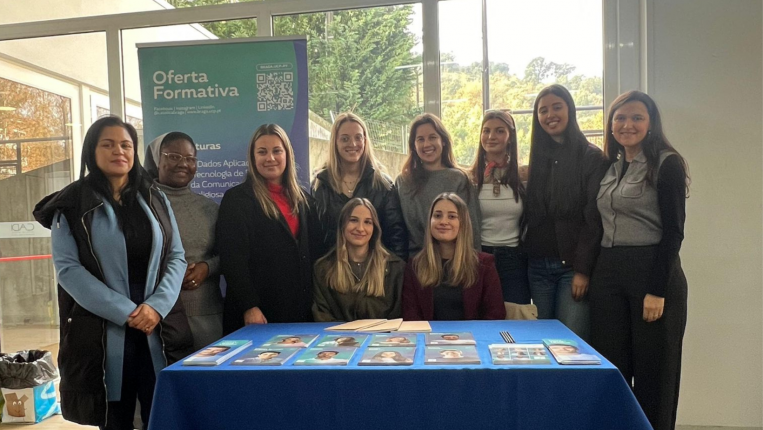More than 40,000 people have been impacted by the initiatives that have taken place as part of around 110 editions of curricular and extracurricular experiences at Universidade Católica Portuguesa that have followed the Service-Learning methodology. In the five semesters the project has been implemented, more than 1,850 students and more than 60 teachers from the four Católica campuses have been involved, in conjunction with more than 250 partner organizations.
These are very expressive figures that describe the CApS project - Catholic University and Service-Learning: Innovation and Social Responsibility - which is currently in its sixth semester of implementation. A project of the Portuguese Catholic University, led by the Faculty of Education and Psychology (FEP) and the Integral Development of the Person Unit (UDIP) of the Catholic University in Porto, with a national scope - therefore having an expression in Porto, Braga, Viseu and Lisbon - which aims to promote and institutionalize the Service-Learning methodology (ApS) at the University and its dissemination in other higher education institutions in Portugal.
The project's coordinators, Luísa Mota Ribeiro, from FEP, and Carmo Themudo, from UDIP, say that it has been very rewarding to lead the CApS Project, which has allowed us to teach and learn while making a difference in the community, and these figures, as well as the testimonies we hear on a daily basis, encourage us to continue with enthusiasm.
When pedagogical innovation and social responsibility come together
This learning model is part of the lines of pedagogical innovation and social responsibility that UCP has been focusing on, whether through the professionals it trains or the work it does in partnership with multiple interlocutors, in line with the Sustainable Development Goals (SDGs).
The ApS is an educational methodology that gives students a more comprehensive and in-depth understanding of curricular topics, along with a greater sense of civic responsibility. In this experience, students develop their knowledge and skills either through experiencing and intervening in a service activity that responds to previously identified needs in the community, or through a continuous process of guided reflection.
The CApS coordinators also explain that the methodology brings countless benefits to all those involved, especially the development of skills by the students in the academic and cognitive, vocational and professional, personal, social, civic and moral-ethical domains.
Nursing homes, day care centers, kindergartens, institutions that support vulnerable families and even the University itself were some of the places that hosted the initiatives and projects developed under the ApS methodology, most of which worked in the areas of solidarity and cooperation, educational and school support, health promotion and the promotion of people's rights.
In questionnaires carried out to evaluate the different phases of the project, several students were interviewed and said that the ApS methodology had an impact on them in different areas, such as: the practical application of theoretical concepts; the promotion of social awareness; the promotion of self-realization; the promotion of a feeling of usefulness; getting closer to future professional practice; the development of professional skills; the development of empathy; increased motivation to help others; the possibility of contact with new realities; and the possibility of contacting and joining a multidisciplinary team.
Alongside the benefits they reap for their development, the students also describe the impact that the application of this methodology has on the final beneficiaries: improved quality of life; high satisfaction/enthusiasm; improved health; increased motivation; greater psychological well-being; development of thinking skills; increased knowledge; development of critical thinking; greater empathy; greater self-esteem; social reintegration, among others.
The Catholic vocation to intervene in society
Partnerships are central to the implementation of the CApS project, with a total of 164 partners from different sectors of activity so far. Of the 83 projects that have taken place as part of the more than 110 curricular or extracurricular units that have followed this methodology, 7 are transdisciplinary projects. Multidisciplinarity and transdisciplinarity are also a very important part of the University's mission, which in each of its four campuses brings together different areas of knowledge. "Transdisciplinarity enriches many projects and brings advantages. On the one hand, it allows problems to be approached from different perspectives, depending on the areas of knowledge involved. Social problems are often complex and involve multiple factors. On the other hand, it makes innovative solutions possible, as the integration of different perspectives can lead to new ideas and solutions that would not be possible if each discipline worked in isolation," they say.
The project is supported by international experts, such as consultants and external evaluators. The impact and effectiveness of CApS is being scientifically evaluated, producing a body of knowledge to improve future actions. The results will be disseminated nationally and internationally.
Robert G. Bringle, consultant to the CApS Project, says that Service-Learning enables students' learning to be enriched through the development of authentic partnerships with the community.
The final phase of the project will expand the University's skills and knowledge in the methodology, allowing it to strengthen ApS in other higher education institutions in Portugal. The Portuguese Catholic University's commitment to the Service-Learning methodology is linked to its vocation to intervene in society.




